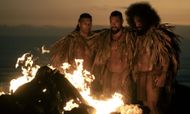Opunui stands out in Chief of War as one of the show’s most unsettling characters, even in a world already marked by ruthless chiefs and constant bloodshed. First seen as a loyal fighter under King Kahekili and later working alongside Keōua, he isn’t driven by politics, loyalty, or the promise of power.
What sets him apart is that he seems to crave violence for its own sake. He doesn’t fight with the intent to secure victory or honor; he fights to leave people broken, both physically and mentally. That reputation makes his presence alone enough to instill fear.
Episode 8 makes it impossible to ignore just how dangerous he is. When Nahi and Heke stumble into the sacred grove, Opunui takes control of the encounter in the most vicious way. Instead of ending the conflict quickly, he draws it out, turning Nahi’s death into a brutal performance meant to terrorize anyone who might hear about it later.
For Heke, the ordeal becomes a nightmare she cannot escape. Through Opunui, the series shows that war in this period was not just about conquest; it was about using cruelty as a weapon, and Opunui is the embodiment of that.
Nahi’s death becomes a message of war, and Heke’s ordeal carries scars far deeper than the physical ones. Through Opunui, Chief of War shows how violence was not only a tool of survival but also a weapon used to terrorize and break communities at a time when kingdoms fought for dominance.
Opunui emerges as the darkest force in Chief of War

Opunui’s arc in Chief of War is defined by his role as an enforcer, a figure who thrives in the shadows of more powerful kings but leaves behind devastation wherever he is sent. From his earliest appearances, he is portrayed not as a chief or strategist but as the kind of fighter rulers call upon when intimidation and brutality are required.
Unlike Kamehameha or Kaʻiana, who wrestle with questions of loyalty, destiny, and leadership, Opunui does not hesitate. His loyalty is transactional, tied to whoever gives him the freedom to unleash violence. This makes him a dangerous asset for Kahekili and later for Keōua, who understand that fear is as useful a weapon as spears or guns.
Episode 8 gives the clearest picture of why he is so feared. When Nahi and Heke encounter Keōua’s forces in the sacred grove, Opunui does not step back and allow the king to demonstrate authority. Instead, he escalates the encounter by ensuring it turns into an act of terror.
Nahi is beaten and humiliated before being killed in one of the most graphic deaths of the series. His presence makes it clear that this is not only about eliminating a rival but also about sending a message through cruelty.
Heke’s treatment further exposes his role as a symbol of unchecked brutality. Her forced march back to Kamehameha’s lands, combined with her visible trauma, is left deliberately raw by the writers, allowing the audience to understand the damage without showing every detail.
The implication is that he saw her not as a prisoner of war but as a tool to deliver psychological warfare. By the time she arrives home broken and silent, his part in the campaign is unmistakable. He represents the violence that continues long after the battlefield is silent.

His importance to the story is not in titles or strategies but in embodying the cost of war on individuals. While kings fight for thrones and chiefs argue about alliances, it is men like him who make the violence personal and unforgettable.
He strips away dignity from enemies, desecrates sacred spaces, and ensures that no act of resistance goes unpunished. In doing so, he becomes one of the most chilling figures in the series, a reminder that history is not only shaped by rulers but also by the ruthless hands they rely on to carry out their will.
Follow for more updates.
